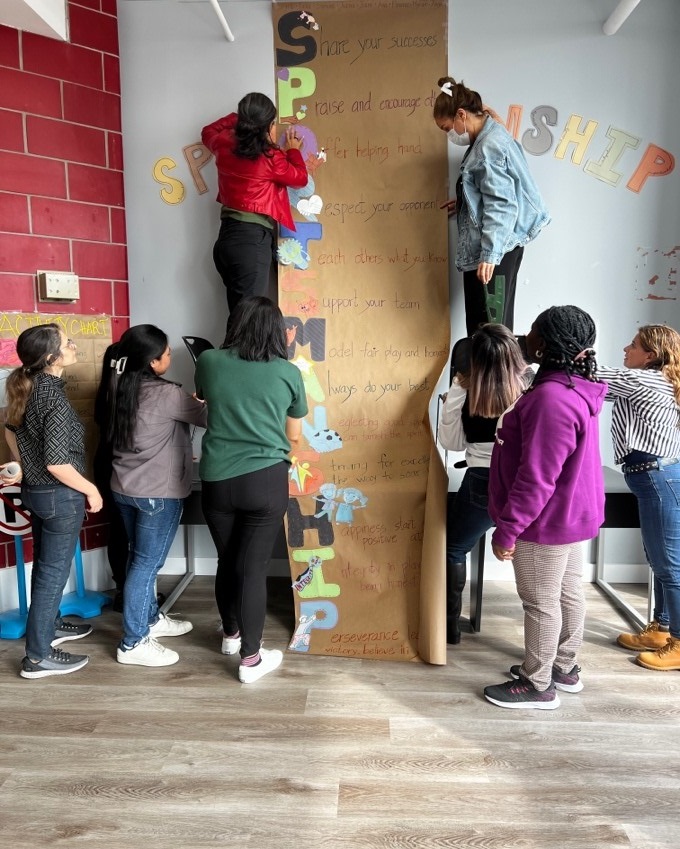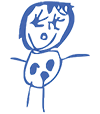EECERA Conference 2025 – Guest Blog # 17: Tapping into the Memory Archive
Posted 15th August 2025
One of a series of short blog posts by presenters who will be sharing their work at the upcoming annual conference in Bratislava, Slovakia. Any views expressed in this post are those of the author(s) and do not necessarily reflect the official stance of their affiliated institution or EECERA.
“Tapping into the Memory Archive for Future Practice in Early Childhood”
By Dina Al-Madhoun – McGill University

ECE students participating in a group reflection activity in my classroom – 2024
Stories carry us back to the places where, once upon a time, we encountered long-quiet childhood memories. Although it may seem paradoxical—and obvious to others—the path forward often begins by looking back. As Canadian poet Lorna Crozier writes, memory “involv[es] at least two parts of you—an older and a younger self” (1993, p. 10). In my role as an instructor in early childhood education (ECE) in Montreal, Canada, I invite pre-service educators to return to those stories—to examine their meanings and how they have shaped, and will continue to shape, both their future practice and the image of the child they hold. On that return, we may notice how we have been shaped culturally, historically, and personally. Yet childhood memories are rarely simple; they are messy and arrive tangled in hope, vulnerability, and at times pain. These feelings often resurface in ECE classrooms when sensitive experiences arise, sparking emotional discussions.
It began in my classroom. As an educator, I started to notice the quiet stories my students carried: stories that had lived at the margins—vulnerable, personal and often unspoken. Though not named in the formal curriculum, these stories, rich in emotion and profound meaning, held what mattered most; they soon became central to our classroom discussions and now ground my doctoral research. My classrooms consist of a blend of local and international learners; many, navigating new cultural and educational environments, critically engage and approach early childhood education with hope, vulnerability, and deep personal investment. Each brings a distinctive perspective on childhood, shaped by family histories, migration, and loss—opening an important space to pause and reflect. Placing these childhood memories alongside our values calls us to an ethical practice: to understand how such memories of the past continue to live within us—bodily, emotionally, and pedagogically—and to what extent they can impact our understanding of the curriculum and our future practice as early childhood educators.
At the 33rd Annual EECERA Conference in Bratislava, I plan to present my ongoing Ph.D. study, “Tapping into the Memory Archive for Future Practice in Early Childhood,” which aims to create a space for future early childhood educators to explore more deeply the relationship between their childhood past and the construction of an imagined early childhood teacher self. This work draws on the systematic (yet thoughtful) application of a curriculum-studies method called currere (Pinar & Grumet, 1976, 2006) and its four modes (regression, progression, analysis, and synthesis) grounded in critical self-reflection and framed within educational contexts. Here, self-reflection and dwelling in that space are not meant to trap us in the past; rather, they serve as a source of continuous growth and forward movement, equipping educators with a deeper sense of purpose and emotional consciousness to ensure that children receive the compassionate and responsive teaching vital for their growth and development.
References:
Crozier, L. (1993). Inventing the hawk. University of Toronto Quarterly, 63(1), 73.
Pinar, W. F., & Grumet, M. R. (1976). Toward a poor curriculum. Kendall/hunt.
Pinar, W. F., & Grumet, M. R. (2006). Toward a poor curriculum. Educator’s International Press.
Researcher’s Background: Dina Al-Madhoun is a lecturer in Early Childhood Education at several colleges in Montreal, Canada, with over 15 years of experience in the field of education. She is currently in her third year of Ph.D. studies in the Department of Integrated Studies in Education (DISE) at McGill University.
LinkedIn profile: https://www.linkedin.com/in/dina-al-madhoun-m-a-b1429530/
Dina Al-Madhoun will present work referred to in this blog in Symposium Set B25 (Tuesday, the 26th of August). (Schedule liable to change; please refer to final programme for details).
